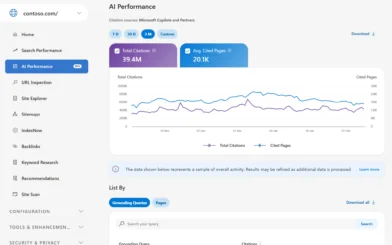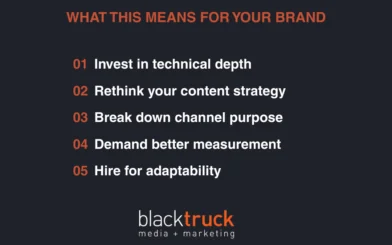Here in the United States, we have certainly been riding a roller coaster of weather-related events at scale. From massive wildfires throughout much of the west coast to hurricane season landing back-to-back storms out of the Atlantic Ocean, it has been anything but a tame summer.
Note: Our thoughts go out to all of the individuals and families affected by these natural disasters. The effects are truly heartbreaking. If you haven’t been personally affected by these events, we encourage you to do your part and get involved in relief efforts at whatever capacity you can.
Given the recent happenings with storms and wildfires in the U.S., I was very intrigued to understand not only what individuals were searching for, but also how search has been influenced by natural disasters over the years.
By following the timeline between Hurricane Katrina in 2005, and the events unfolding with Hurricane Irma in 2017, the goal was to better understand and provide insights on how search has evolved with each major instance and trying to draw out any correlation between major natural disasters and the evolution of search over time.
Before we dive in, it is important to remember that from a technology standpoint, a lot has changed in 12 years. Back in 2005, our everyday lives were not even close to being as connected as they are now. When Hurricane Katrina made landfall, Facebook was just over a year old with 5 million users; the iPhone wouldn’t even be announced for 2 more years; and the concept of mobile web was in infancy. All of these are very much a part of our daily lives now, and we don’t give them a second thought.
Understanding Search Behavior Trends
Sticking with some fairly basic tools used by search marketers, you can quickly gather insights that help paint a picture of the past and current events, along with search queries relevant to each of those.
In an effort to keep somewhat of an even playing field, 4 key phrases are used as the basis of research to show different stages and possibilities of intent.
- How to prepare for a hurricane – typically “how to” based questions are either leading up to an action (event), or a search happening in more real time.
- Hurricane preparedness – the more general search of one being prepared for an event.
- Hurricane safety – more of the “what” side of search intent and knowledge for an event.
- What to do during a hurricane – combination phrase for someone seeking out information before, during, or after.
Google Trends for Hurricane-related Searches
Although it has come under fire for accuracy, Google Trends can be used to get a solid sense of where activity was/is at a given point. Dropping in the 4 search queries, and filtering to the past 12 years, we get a pretty clear picture.
Google Trends does a good job at telling the story of user interactions with search during the series of events that took place in the past 12 years. The spikes in the graph correlate with the time period either leading up to, or directly during and after one of the major hurricanes in that year.
Hurricane Katrina – August 23, 2005
Starting with Hurricane Katrina in August 2005, major search queries for being prepared in a hurricane did not happen until after the devastating event. Fast forward to Hurricane Ike in September 2008, and we see a much more timely search pattern, a trend that will continue to play out and increase in the next 9 years.
Shifts in Search Behavior
The evolution of these searches over the past 12 years delivers some amazing insights on how individuals are using the Internet. Continuing to use Google Trends data over the 12 year time period from Katrina to Irma, we can start to get a sense of the shift in user search intent from a more broad stroke of general safety, to preparation for such an event.
Hurricane Katrina – August 2005 to Hurricane Ike – September 2008
Search intent was very much focused on hurricane safety, somewhat of a generality in the sense of being informed for such a major weather event.
Hurricane Irene – August 2011
At this point, searcher behavior shifts away from general hurricane safety being the dominant focus, toward being prepared and what to do during a hurricane. This only lasts for a short period of time, showing searches in the United States falling back to the general “hurricane safety” query.
Hurricane Harvey – August 2017 to Hurricane Irma – September 2017
Here we see major shifts in search intent; the popularity of queries related to being prepared and what to do in the event of a hurricane show exponential growth.
Google Trends is great for understanding exactly that – what’s trending at a certain time period – but it’s not always great at showing us the full picture of individuals’ interest levels surrounding such events.
How, Why, What If, Causes Of
Taking research a step further with knowledge of the major events (hurricane name), I set out to identify common themes amongst the major storms that occurred. Now, we cannot jump back in time to see all of that data at a historical level, but using tools and information available to us at this current time, we’re able to gain insights based on the public searches.
There are a few tools out there that can help mimic Google Suggest – Soovle, Answer The Public, Keyword.io and Moz’s Keyword Explorer, to name a few. Shifting my mindset, I started to treat each of these hurricanes as a brand, using their names for keyword research.
Dropping their names into these tools, exporting the data, and running a series of online NGram analyzers and text comparison tools, themes start to surface.

The themes that stand out the most are those that lead us down the path of either preparation or reflection. The argument can even be made that reflection leads to preparation. Phrases of comparing one hurricane to another come up, showing research of historical storm magnitude. Geographical searches show that people are concerned with how far a storm might travel and if it could hit their region.

Yellow = Hurricane Safety / Red = Hurricane Preparedness

2005 Search Comparisons

2017 Search Comparisons
While historical search data can be limited at times, and comparing queries around natural disasters might not be the happiest of subjects, it’s very clear the more connected the world has become in our everyday lives, the more concerned we also become with events and the impact they can have on our communities.



